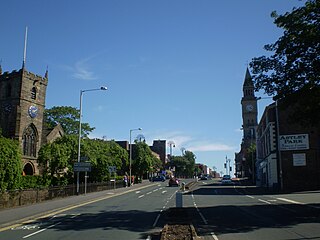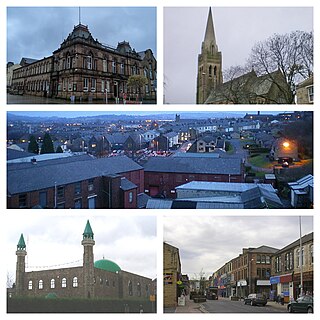Lancashire is a county in England.
Contents
Lancashire may also refer to:
Lancashire is a county in England.
Lancashire may also refer to:
Canterbury is a city located in the county of Kent in southeast England. It may also refer to:

Lancashire is a ceremonial county in North West England. It is bordered by Cumbria to the north, North Yorkshire and West Yorkshire to the east, Greater Manchester and Merseyside to the south, and the Irish Sea to the west. The largest settlement is Blackpool.

Cumbria is a ceremonial county in North West England. It borders the Scottish council areas of Dumfries and Galloway and Scottish Borders to the north, Northumberland and County Durham to the east, North Yorkshire to the south-east, Lancashire to the south, and the Irish Sea to the west. Its largest settlement is the city of Carlisle.
Derby is a city in Derbyshire, England.

Chorley is a town and the administrative centre of the wider Borough of Chorley in Lancashire, England, 8 miles (13 km) north of Wigan, 11 miles (18 km) south west of Blackburn, 11 miles (18 km) north west of Bolton, 12 miles (19 km) south of Preston and 20 miles (32 km) north west of Manchester. The town's wealth came principally from the cotton industry.
York is a city in North Yorkshire, England, and the historical capital of Yorkshire.
Nelson may refer to:

Consett is a town in the County Durham district, in the ceremonial county of Durham, England, about 14 miles (23 km) south-west of Newcastle upon Tyne. It had a population of 27,394 in 2001 and an estimate of 25,812 in 2019.

Rochdale is a town in Greater Manchester, England, and the administrative centre of the Metropolitan Borough of Rochdale. In the 2021 census the town had a population of 111,261, compared to 223,773 for the wider borough. Rochdale is in the foothills of the South Pennines and lies in the dale (valley) of the River Roch, 5 miles (8 km) northwest of Oldham, and 10 miles (16 km) northeast of Manchester.

Southern England, also known as the South of England or the South, is a sub-national part of England with cultural, economic and political differences from both the Midlands and the North. The Midlands form a dialect chain in a notable north–south divide of England. The sub-national area's official population is nearly 28 million and an area of 62,042 square kilometres (23,955 sq mi): roughly 40% of United Kingdom's population and approximately a quarter of its area.

Nelson is a town and civil parish in the Borough of Pendle in Lancashire, England, it had a population of 29,135 in the 2011 Census. Nelson is 3 miles (5 km) north of Burnley and 2 miles (3 km) south-west of Colne. Nelson developed as a mill town during the Industrial Revolution.

Dalton-in-Furness is a town in the ceremonial county of Cumbria, England. It is in the parish of Dalton Town with Newton, in the Westmorland and Furness district. In 2011 it had a population of 7,827. It is 4 miles (6 km) north east of Barrow-in-Furness.
Blackpool is a seaside town in England, United Kingdom.

Sheffield has a long history of involvement in sport. Although cricket was the first organised sport, it has gradually been supplanted by football. Both the main two local football teams grew out of cricket teams. Sheffield can claim many firsts in football the most famous one being Sheffield F.C. being the world's first and oldest football club. Today it has a club in every major team sport in England. Sheffield became the first UK National City of Sport in 1995 and is now home to the English Institute of Sport (EIS).

Fulwood is a suburb of Preston, Lancashire, England, in the northern half of the City of Preston district. It had a population of 28,535 in 2011 and is made up of five wards.
Sport in England plays a prominent role in English society. Popular teams sports in England include association football, field hockey, cricket, rugby union, rugby league, and netball. Major individual sports include badminton, athletics, tennis, boxing, golf, cycling, motorsport, and horseracing. Cricket is regarded as the national summer sport. Association football is the most popular sport, followed by cricket, tennis and rugby. A number of modern sports were codified in England during the nineteenth century, among them cricket, rugby union, rugby league, football, field hockey, bandy, squash, tennis, and badminton. The game of baseball was first described in 18th century England.
Manchester City and Manchester United are popular Premier League football clubs in Greater Manchester. United's ground is in Old Trafford; Manchester City's home ground is the City of Manchester Stadium in east Manchester. Fixtures between the clubs are referred to as the Manchester Derby. Manchester United are historically the second most successful football club in England with 67 elite honours won and was the first team in England to achieve the Continental treble. Manchester United's revenue was the fifth highest of a football club in the world in the 2022–23 season at €745.8 million. In 2023, Forbes estimated the club was the second most valuable in the world at $6 billion.
Wigan is a town in Greater Manchester, England.
George Nicholls is an English former professional rugby league footballer who played in the 1970s and 1980s. A Great Britain and England international representative forward, he played his club rugby for English sides Widnes and St. Helens. Eventually becoming a St Helens R.F.C. Hall of Fame inductee, he also became the first player to win the Man of Steel Award, Harry Sunderland Trophy and Lance Todd Trophy with the club. With Great Britain, Nicholls also won the 1972 Rugby League World Cup.
Lancaster may refer to: